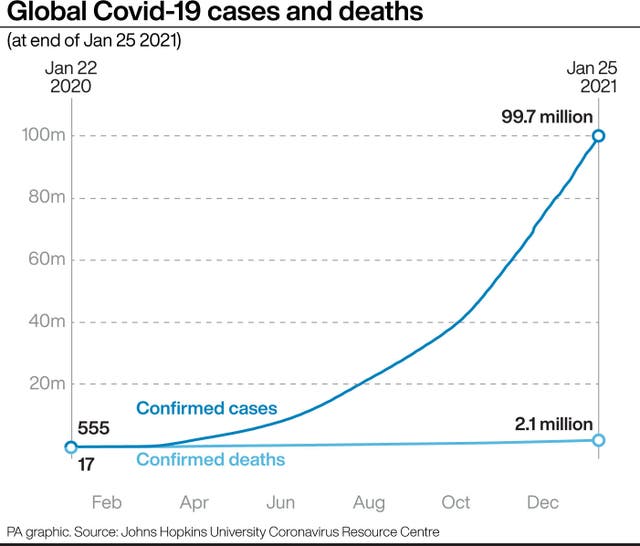
Coronavirus could become a “much more treatable disease” over the next six to 18 months, with the hope of a return to a “much more normal future”, the head of the NHS has said.
Sir Simon Stevens told MPs he hoped more treatments for Covid-19 would come on stream which, coupled with vaccination, would see a turn for the better.
And he said it “would be great” if the Covid vaccine and flu vaccine were combined into a single jab, if not for next winter then future ones.
“The first half of the year, vaccination is going to be crucial,” he said.
“I think a lot of us in the health service are increasingly hopeful that the second half of the year and beyond we will also see more therapeutics and more treatments for coronavirus.”
He said there were a number of potential new treatments in the pipeline “and I think it is possible that over the course of the next six to 18 months, coronavirus becomes a much more treatable disease with antivirals and other therapies, which alongside the vaccination programme holds out the hope of a return to a much more normal future.”
Sir Simon also told the Health and Social Care Committee that vaccines were being used as fast as they arrived in the NHS, and more than half of those aged 75-79 have now had their first vaccine doses.
“We are at the moment pretty much using up each week’s vaccine as we get it, as we receive it through the safety testing, the batch testing, distribution to the NHS, then it gets sent out across the country,” he said.
Asked about vaccine priority, he said teachers, police and people with learning disabilities will need to be considered for the next round of Covid-19 vaccinations, and suggested that this should perhaps happen as early as February.
“Our current proposition that once we have offered a vaccination to everyone aged 70 and above, and the clinically extremely vulnerable, then the next group of people would be people in their 60s and 50s, but there will also be a legitimate discussion in my view that the Joint Committee on Vaccination and Immunisation will have to advise on as to whether or not there are certain other groups who should receive that priority.
“People with learning disabilities and autism, certain key public service workers, teachers, the police, they will have to be factored in that post-February 15 prioritisation decision.”
Sir Simon said reducing the number of hospital beds occupied by Covid-19 patients was not “the only consideration” policymakers would take into account when deciding the vaccination priority list.
“Fundamentally, the most important thing is to get the overall infection rate down, this is not principally about pressure on the NHS, this is principally about reducing the avoidable death rate,” he added.
Vaccinating everyone aged 65 and over will have a “big impact” on the pressure on hospital beds, Sir Simon said, but added that about a quarter of hospital admissions for Covid are for people aged under 55, and about half of inpatient critical care bed days for coronavirus relate to patients under the age of 65.
Asked about current pressure on the system, he added: “Everybody is getting intensive care and ventilators who clinicians think would benefit, but let’s not disguise the fact that this is obviously stretching the system in an extreme way.”
Earlier, Sir Simon said there will come a point where people are told they can come forward for a vaccination if they have not yet received one.
“As we move through each successive cohort there will come a moment when we will say: ‘If you haven’t been contacted then please come forward yourselves.’

“Right now, because we have been asked to move down the risk pyramid, the NHS is asking people to book an appointment, so we’re saying: ‘Wait for us to contact you’, rather than: ‘You phone your surgery’, for example.
“But as we get to the end of each cohort we will then be saying very clearly: ‘If you fall into this category and you haven’t been vaccinated, here’s how you can come forward and be vaccinated.'”
Asked about the impact on cancer treatment due to an NHS under pressure, Sir Simon said he was “concerned” about cancer surgery.
He said there was a “huge focus” to ensure that services for those requiring urgent cancer surgery were sustained.
He added: “There’s particular pressure on anaesthetists at the moment, many of whom are being diverted to help the critical care surge for coronavirus patients.”
Sir Simon said just under 33,000 Covid patients are currently in hospitals across the country, which was “very, very serious”.
He added: “When you look at the critical care positions, again, we have got over 4,000 patients in critical care and about three-quarters of our critical care are there for Covid-related reasons.”


Comments: Our rules
We want our comments to be a lively and valuable part of our community - a place where readers can debate and engage with the most important local issues. The ability to comment on our stories is a privilege, not a right, however, and that privilege may be withdrawn if it is abused or misused.
Please report any comments that break our rules.
Read the rules here